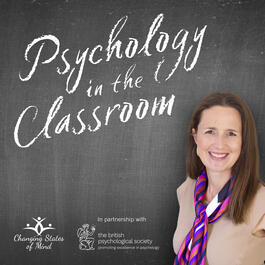
Psychology in the Classroom
The show that takes psychological research and translates it for classroom teachers so they can effectively apply it to their teaching practice to help improve outcomes for their students. Interviews with leading psychologists and other experts in the field of education, as well as deep dives into educational theory and a little bit of neuromyth busting.
Show episodes

The Perils of Perfectionism: Understanding Its Impact on Mental Health in Education
In this episode we explores the impact of perfectionism on exam anxiety, particularly among neurodivergent individuals. Dr. Tracey Donachie, a lecturer in sports and exercise psychology, discusses the components and prevalence of perfectionism, highlighting its psychological and behavioral effects. Maciej Matejko, from
Summary In this episode Dr. Carolina Guzman Holst is a NIHR Research Fellow at the University of Oxford, discusses her recent paper titled Scoping review: potential harm from school-based group mental health interventions. Where the authors ‘examine three areas: the types of potential harms and adverse events reported
This month Dr Katy Burgess, Senior Lecturer in Psychology at Cardiff University, talks about her research into students’ learning - what they do and how effective they think this is - this is useful for us, as teachers, to understand how, what we are teaching them in school about learning and revision, is being interpr
The NEurodivergent peer Support Toolkit (NEST) is a set of free resources for staff in mainstream secondary schools who wish to facilitate peer support for neurodivergent young people. The toolkit was co-created by researchers at the University of Edinburgh, neurodivergent young people and a neurodiverse group of adult
This is the 7th podcast from the RE-STAR team and Professor Edmund Sonuga-Barke and Dr Georgia Pavlopoulou share the findings from work package one. This episode explores how the RE-STAR team has collected qualitative data through innovative methods that really allow the voices of young people with ADHD and Autism to b
In this week’s episode Purvi (Vi) Gandhi shares her knowledge about implementing effective and evidence based strategies to improve mental health or mental fitness in schools. Vi has recently published a book 'A little guide for teachers: Student Mental Health' with lots of ideas of how teachers can support the mental